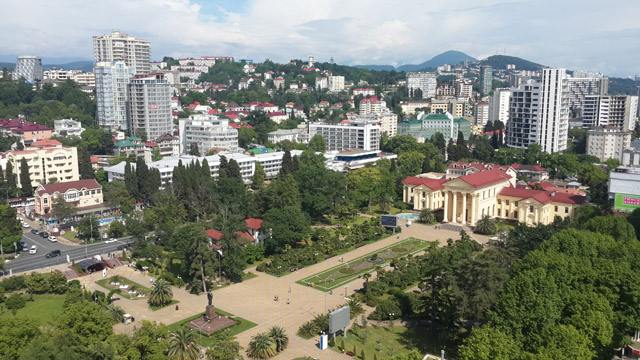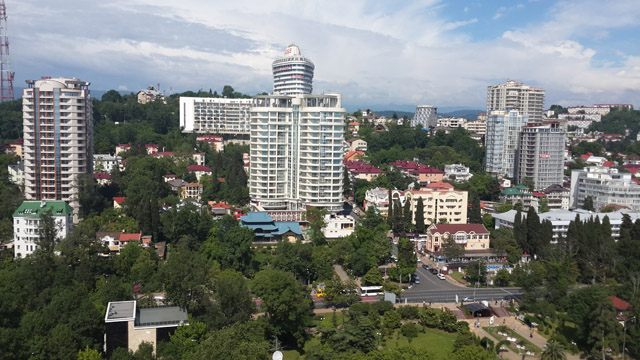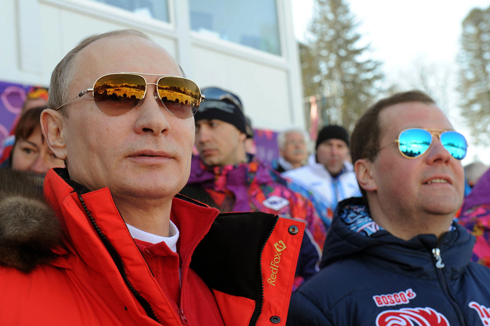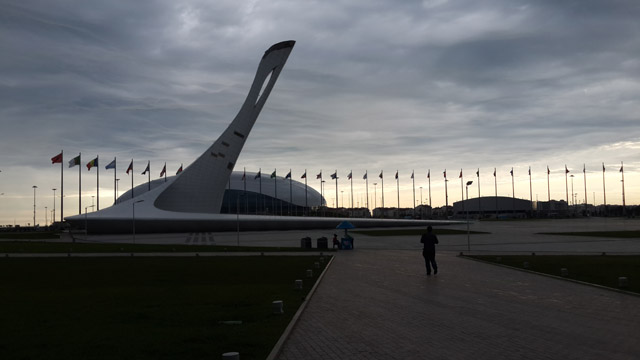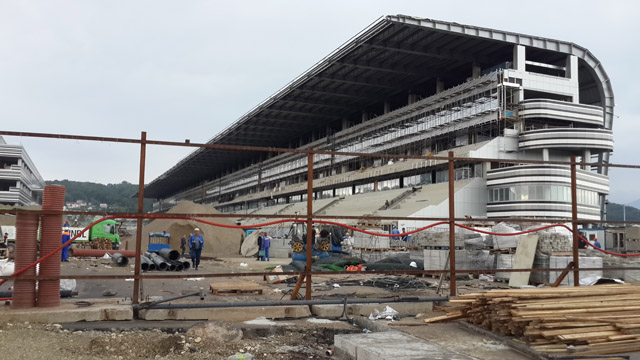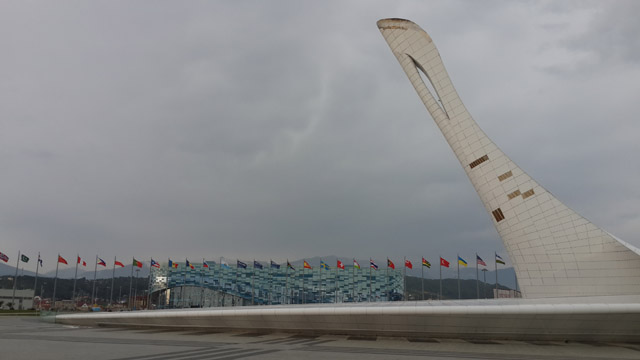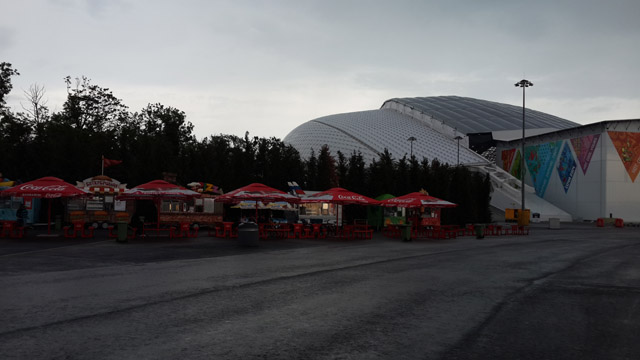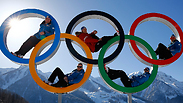
Sochi lives on
With the Winter Olympics fading into history, the people of this Black Sea resort are determined to maximize the opportunities that the famous competition has given them, and some are even using Israel as an inspiration.
When the early settlers of pre-state Israel wished to drain the swamps in the late 1800s, they planted eucalyptus trees all over the country. Now, 125 years later, when the people of Sochi were looking to improve their quality of life, they didn’t stop with importing vegetation - they put on the Olympics. In south Sochi, one of the hottest places in Russia, a series of Olympic stadiums and facilities were erected from scratch, as part of an unprecedented construction project in the history of the hosting cities. But the world’s attention was rather focused on something else - the infamous picture of the "double toilet" stall that circulated online.
The photo, whose authenticity is still questionable, became a symbol for all the concerns raised before the opening ceremony: The deadlines being missed, the disruption of the lives of locals, the possibility of terror attacks and so on. In retrospect, these were probably the most slandered Olympic Games ever, with the exception of the ones in Berlin in 1936. But Sochi doesn’t dwell on the past: After the athletes left and the dust settled, they were quick to move on to their next challenge - the day after.
Hosting the Olympic Games can make or break a city. In the case of Athens, they contributed a great deal to the economic crisis which crippled the country, while in Barcelona’s case, the city inherited a beach and became a worthy rival to Madrid as a prominent tourist attraction. The administration of Sochi, for its part, is sure it’s going to follow the latter’s example.
“As part of the preparation process, we sent delegations to Beijing, to Vancouver, and to London, and I think we’ve surpassed them in terms of the number and quality of the new structures, the logistic operation, and the general organization, despite our weakness - not knowing English,” says Irina Romanets, Sochi's deputy mayor. “Of course, our Russian hospitality also played a part in our success.”
“The development that Sochi underwent in the last five years can only be compared to the 300 years during which Peter the Great built Saint Petersburg,” she continues. “A year ago the city was being suffocated by traffic, and nowadays the jam is gone, thanks to the new roads paved for the Games. We’ve built new green power plants, new hospitals, and cultural establishments. The city now attracts new residents and many come to work and study.”
But the urban development came at the great expense of local residents, some of whom were even forced to evacuate their homes. The municipality puts their number at around 500 people, but other sources indicate it’s closer to 2,000. “Today no one is displeased with what happened,” insists Romanets.
“The compensation they received from the government was more than adequate, and some even profited. There was no coercion, each was given the choice between a new apartment, a private residence, and monetary compensation. In London, the evacuees were offered much less.”
“All Olympic Games have negative moments, but the foreign experts and journalists chose to highlight only those aspects,” claims Prof. Alexander Vetitnev of Sochi State University. The unversity conducted public opinion surveys before and after the Olympics, and according to Vetitnev, even those who voiced the strongest objections have come around.
“The Olympics contributed to the unity of our nation. One needed to be in the crowd in order to understand the pride we felt. Now, when people claim the Sochi Olympics was Putin’s Olympics, I say ‘yes! But we should be proud that we have a president who was able to realize a project like this.’”
The officials in Sochi have no doubts about the identities of those responsible for the criticism. “The critique originated in the US, this is not Europe,” argues Sergey Svetlov, a consultant to the Sochi municipality on foreign affairs. “The concerns of our guests disappeared as soon as they got here. The accusations came from media bodies that were bought, which wanted to prove that Russia is unable to stage an event of this size.”
A Moscow official raises similar claims. “The US-financed propaganda machine tried to state these were the Games of the fascist Putin, and compared them to Hitler’s Games,” says vice chairman of the committee on international affairs in the Duma, Alexander Romanovich.
“Sadly for those responsible for these ideas,” Romanovich continues, “they discovered that the Games became a symbol of camaraderie between all nations, despite the slander. All the attempts to boycott the Games failed, and the morale in Russia soared and is still pushing the whole country forward.”
The people of Sochi can also testify to the PR contribution: “Everyone in Russia had already heard of Sochi, but now it’s known internationally,” says Artiom Ivannikov, a local who was also involved in the Sochi Olympic Committee. “We already feel the affects of this, but it’s still too early to say to what degree we will be able to utilize the post-Olympic legacy to our advantage.”
The lessons drawn from past Olympic Games indicate that the key to turning their inheritance into urban prosperity is not necessary reconciling with the locals - but rather the secret is the correct reuse of the structures built for the Olympics. And so, while the stadiums of Athens rusted away, in Barcelona they became theaters and concert venues. The Sochi administration, on the other hand, does not plan to reinvent the wheel. “We are open to suggestions and many entrepreneurs are showing interest,” claims Romanets.
The demand is boosted by the government’s order to hold all official gatherings and conventions at the Sochi stadia, but even regardless, it seems that the option to hold events where the Olympic Games once took place has great appeal of its own. The hockey stadium at the Olympic Park has already hosted amateur tournaments; Adler Arena is being converted for the Russian tennis championship and wrestling matches, and around the park a Formula 1 course is being paved. The city is also meant to hold an international choir competition, but first and foremost it’s going to host the FIFA World Cup in 2018.
Other facilities are planned for use in training for the national winter sports teams, which beforehand had been forced to practice abroad. Some of the structures might even be opening to the general public, such as the bobsled course that is thought will be turned into an amusement park.
The municipality is also hopeful that the Olympic Park itself will attract families looking to enjoy the outdoors. “We were in Jerusalem recently and we were very much impressed by how the people spent their holidays barbecuing in the parks,” says Romanets. “We are hoping that our park will be used in the same way.”
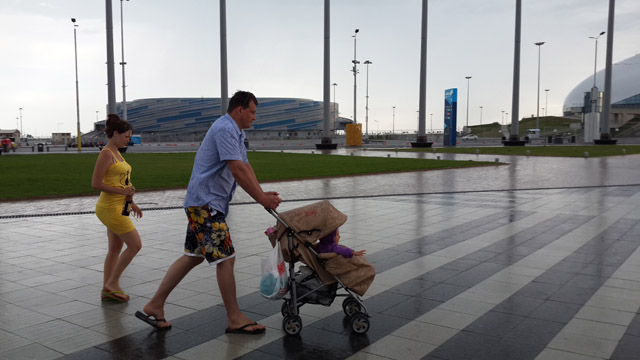
But the probability that her wish will come true is slim, at least at this point. The Olympic Park is a jungle of concrete and glass, and the ongoing construction might interfere with quality family time. The lawns are few, “but there are more green areas closer to the beach and people can also swim there,” notes Ivannikov, who now studies the effect of the Olympics on tourism in town. The open areas are surrounded by buildings which once hosted the athletes and now stand vacant, waiting for someone to buy them.
The structures up in the mountains also will probably need to undergo some maintenance work before they could be used for the routine training of athletes. The biathlon facility, for instance, which the organizers claim was awarded the highest seal of approval from experts, is already dotted with rust spots and peeling paint, even though it’s been less than a year since it was used during the competitions.
On the other hand, the luxury resort Rosa Khutor, which will continue functioning as an alpine ski resort using the artificial snow that facilitated the winter games, still looks brand new. The snowy mountain tops around it make one easily forget that less than 40 miles away people are walking around in bathing suits, and the Swiss-like architectural style induces the feeling that one’s nowhere in Russia. However, it’s unclear what would make European tourists, for example, who live right next to the Alps, travel to this site instead of enjoying the original in their backyard.
“The plan is to develop Sochi as a year-round resort, which will attract ski enthusiasts in the winter, beachlovers in the summer, and businessmen coming to international events, like the Sochi economic forum, our fashion week, and so on,” explains Prof. Vetitnev, who conducted studies about tourism. “We also have natural treasures such as mineral-rich waters and the infrastructure for health tourism. That direction existed before the Olympics, and although the games diverted attention from it a bit, we still plan to pursue it.”
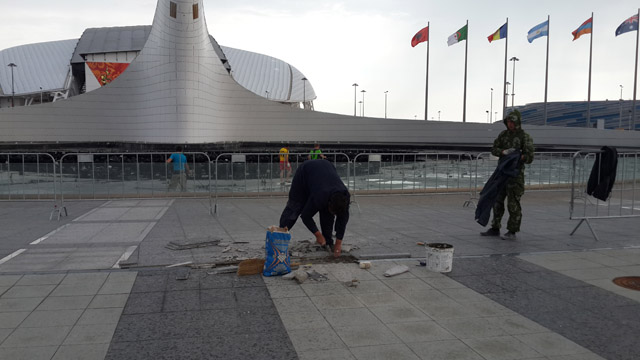
According to Vetitnev, the government's hope is to change, for the first time, the ratio between foreigners and Russian tourists coming to Sochi, and to attract more visitors from abroad. In numbers, the goal is reaching seven to eight million tourists per year - almost double than the current flow of three to five million visitors every summer. The experts estimate that achieving this is the only way the city could ever cover the massive cost of the Olympics.
“Sochi’s deficit was large even before the games and now it’s even larger,” says another researcher, Prof. Pyotr Chuvatkin. “The solution of this problem depends on the ability to realize the plans to increase tourism. This won’t be easy for Sochi, but it all depends on the quality of our touristic product.”
Sochi’s attempt to attract tourists is indeed getting the full support of the government, but Moscow's decision to annex Crimea, also on the coast of the Black Sea, has actually created an unexpected challenge for the authorities in Sochi. ”The average price of a holiday package in Sochi in twice higher than of one in Crimea, and that’s a problem we’re determined to solve,” promises Vetitnev.
The municipality is even more optimistic. “We’re not afraid that tourists will prefer Crimea to Sochi,” asserts Romanets. “We’re glad to be reunited with Crimea, because we are one people and we all have relatives there - but when it comes to tourism, we attract different people. Sochi is a well established luxurious resort, which offers vacations for various prices. Those who have traveled to Crimea so far will continue doing so, but that doesn’t hurt our businesses. On the contrary, now we can collaborate.”
Her optimism also relies on the fact that situation in Crimea has stabilized; but, closer to Sochi, in east Ukraine, the crisis is still in full swing. Even so, the local Sochi government seems dismissive of the threat - just as it did in response to the fear of terror attacks raised before the Olympics.
“Tourism is the locals' bread and butter and they have no interest importing conflicts from outside,” explains Prof. Chuvatkin.
“Those who pointed at the possibility of terror attacks against Sochi forgot that this is the third most popular tourist site in Russia, which is visited even by high-ranking officials,” adds another Sochi State University researcher. “Sochi hasn't had a history of conflicts in the last 250 years, and that makes it one of the safest cities for tourists in the world.”










